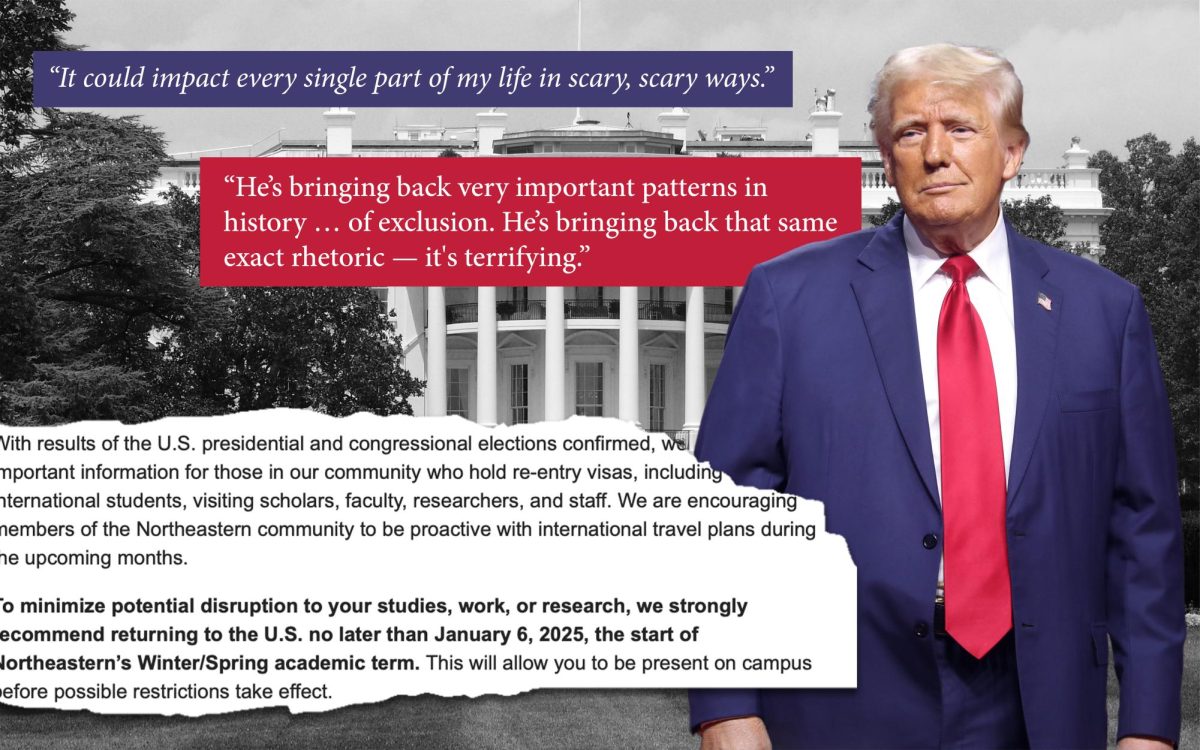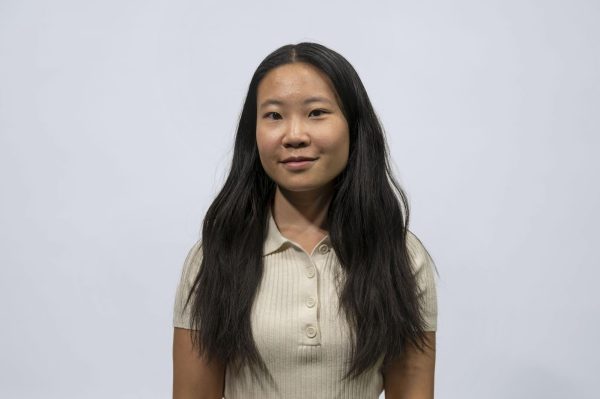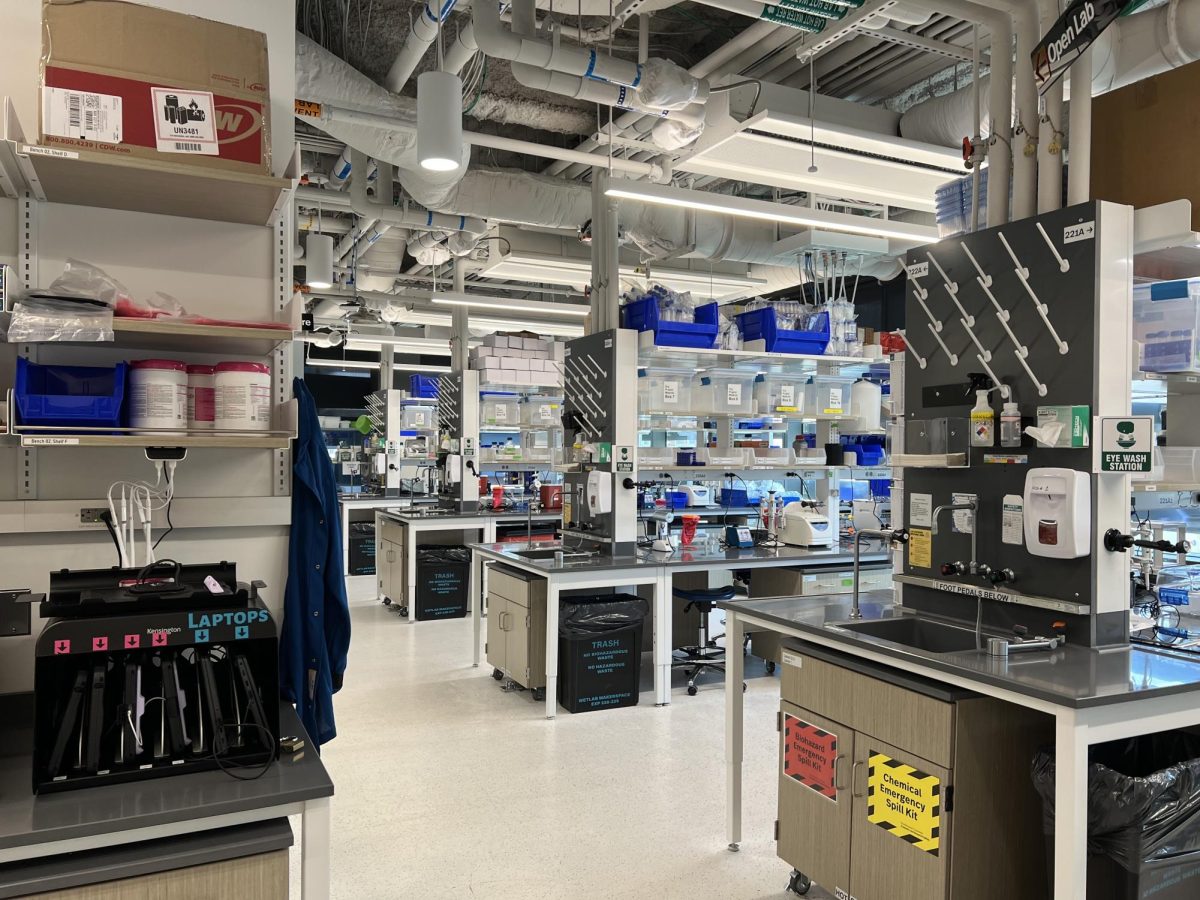The last time President-elect Donald Trump was in the Oval Office, most undergraduate students at Northeastern were in middle school.
Though some remember the rhetoric — mostly anti-immigrant, sexist and inflammatory LGBTQ+ sentiments — that marked his first stint in the White House, students and experts say his second presidency is likely to do more damage to marginalized communities. While Massachusetts state legislators have vowed to do everything in their power to stave off Trump’s possible damaging policies, students are concerned his speech will embolden extremists and that his administration’s agenda will negatively impact their lives over the next four years.
“I’m worried about how many of my family members and community would be directly impacted by Trump’s immigration rhetoric,” said Kevin Mai, a fourth-year bioengineering major whose parents are immigrants from Vietnam. “I know that currently a lot of the focus on immigration is on immigrants coming from Latin and South America … [but] when one domino falls, the rest fall too. How long will it take before the focus shifts to immigrants from other regions?”
On Nov. 22, Northeastern sent an email to community members who hold reentry visas warning international students, visiting scholars, faculty, researchers and staff to be “proactive with international travel plans during the upcoming months” in light of the “results of the U.S. presidential and congressional elections.” The email, obtained by The News, recommended those on visas return to the United States by Jan. 6, 2025, before “possible restrictions take effect.”
The concern for international students and scholars — of which Northeastern has the second-most of any university in the country — isn’t unfounded. Molly O’Shea, a senior associate at immigration law firm Clark Lau LLC, said the last Trump administration attempted to curtail several policies beneficial to international students and complicated the process for entering the U.S. The firm is expecting the next four years to be even more tumultuous.
“With Trump, with his first administration, they were a bit disorganized in their approach,” O’Shea said. “This time around, the theory I’ve heard often is Trump and his team have been planning for four years now. They have a bit more of a strategy in place.”
During his first term, Trump’s administration proposed restricting a program called Optional Practical Training, or OPT. In 2023, more than 160,000 students in the U.S. participated in OPT, which allows eligible students to work in the U.S. in their field of study for one year after graduation. Trump’s administration attempted to eliminate a similar program, called STEM OPT, which allows students in science-related fields to stay for an additional two years.
Though neither of the rules went through during his last term, O’Shea said she expects the president-elect will likely try again.
“We do think it’s possible that this is something that’s going to come to the surface again during Trump 2.0, that there could be challenges to the program and who is eligible to take part in the program,” she said, adding that many students chose to go on OPT after completing their time in college on an F-1 visa.
OPT is also a crucial step for those hoping to obtain permanent residency in the U.S. After completing the program, students usually apply for an H-1B visa, which allows for temporary employment in the U.S. H-1B visas, which are usually a step toward getting a Green Card, are chosen through a lottery system with a 20-25% selection rate each year — OPT and STEM OPT offer students critical extensions to apply for temporary work authorization multiple times.
“The good thing about OPT and particularly STEM OPT is that [students] have those three years of fairly stable work authorization, which gives most folks at least two to three tries at that H-1B lottery,” O’Shea said. “If STEM OPT is eliminated and they really only have one shot, then there’s a lot more pressure.”
Students’ concerns extend beyond their own ability to study or work in the U.S. Mai, who is a U.S. citizen, said their worry lies more with how the people around them will be impacted.
“Even though I’m privileged enough to essentially not worry about it, there are people in my community who do worry about this, and we’ll all suffer together,” Mai said.
Rashida Jalloh, a fourth-year communication and media studies combined major and co-president of the Northeastern Black Students Association whose parents immigrated from Sierra Leone, said she remembers delays in her family members getting visas to visit the U.S. during Trump’s first term.
“At the time, my grandmother was trying to come to the states, and there was a longer process of getting a visa or Green Card for her,” Jalloh said. “My parents were always complaining about having their family come to America, and they really couldn’t.”
Besides fear about tangible immigration policies Trump’s administration may implement, students also said they’re concerned about the anti-immigrant and racist rhetoric Trump voiced in his first term and throughout his 2024 campaign.
“I remember the racist nuances that would be spewed from Trump and his supporters,” Jalloh said. “I remember the ‘Africa is a sh*thole’ comment.”
Sofía Zamora Morales, a third-year politics, philosophy, and economics major who immigrated with her family to the U.S. from Chile in 2018, said she’s worried Trump is echoing sentiments that led to the Chinese Exclusion Acts, which effectively barred Chinese people from immigrating to the U.S. and becoming citizens, throughout the late 19th and mid-20th centuries.
“He’s bringing back very important patterns in history … of exclusion,” Morales said. “He’s bringing back that same exact rhetoric — it’s terrifying.”
O’Shea said while it’s possible Trump will attempt to implement identity-specific immigration restrictions — like his 2017 executive order that barred people from six Muslim-majority countries from entering the U.S. — the more serious concern for students is increased security screenings before entering the U.S., causing delays and complications during travel.
“It’s just disappointing given how America traditionally embraces immigrants, that it seems now more of the public has this negative perception of a lot of immigrants,” said Giannis Kastanos, a fourth-year biochemistry major and immigrant from Greece. “It feels like Trump has been really careful to say that he’s only talking about illegal immigrants, but it definitely feels the rhetoric that he is using and the people that he has surrounding him are extending that to anyone that’s not American-born.”
Between 2017 and 2019, white nationalist hate groups increased by 55% in the U.S., a phenomenon the Southern Poverty Law Center reported could be attributed to Trump’s first campaign “energiz[ing] white nationalists.” In the same year, anti-LGBTQ+ hate groups increased by 43%; students who are part of both communities said, more than anything, they’re worried about a rise in hate crimes and discrimination.
Dakota Castro-Jarrett, a fourth-year journalism major who is Black and a part of the LGBTQ+ community, said Trump’s recent campaign has produced “a lot of animosity.”
“I’ve definitely experienced more explicit homophobia than I ever really have throughout my entire life,” he said, adding that he’s faced discrimination in his home city of Pittsburgh for dressing femininely.
Castro-Jarrett said he’s also concerned Obergefell v. Hodges, the landmark 2015 Supreme Court case that legalized gay marriage, could be overturned after Trump appointed three conservative-leaning justices his last term. He isn’t alone.
“[Trump’s] work with the Supreme Court is just insane — the way he’s trying to appoint someone else to it to threaten same-sex marriage and further push abortion bans,” said Morales, who is queer. “It could impact every single part of my life in scary, scary ways.”
The president-elect’s stance on abortion was also a controversial part of his 2016 and 2024 platforms. In 2016, Trump advocated for an abortion ban, and the Supreme Court justices he appointed eventually overturned Roe v. Wade in 2022. In the run-up to the recent election, Trump flip-flopped on the abortion question, ultimately saying he would veto a 15-week national abortion ban, which several of his cabinet picks support.
“Roe v. Wade was the law of the land, but Trump put in the groundwork to unravel that,” MaryRose Mazzola, chief external affairs officer at Planned Parenthood League of Massachusetts, said in an interview with The News. “What we saw in his most recent campaign is Trump and his associates running away from that record and saying they wouldn’t pass a national abortion ban, but we really have to look at and trust his record on this issue. He’s bragged about overturning Roe v. Wade. We’re had folks in his orbit including his incoming [vice president] saying they want to investigate Planned Parenthood.”
Mazzola said as long as there isn’t a national abortion ban, access to the procedure or pill is likely to remain available in Massachusetts.
As students brace for whatever Trump’s impact may be, both Mazzola and O’Shea said Northeastern can play a critical role in protecting students from possibly harmful policies.
“It’s not required by law, but private universities can make sure they’re providing reproductive care directly or they have good relationships with area health centers they’re referring students to,” Mazzola said. Northeastern’s health center says it offers consultations and referrals for abortion services.
O’Shea said immigration restrictions are likely to see pushback and legal challenges from universities and companies that rely on visas for students and employees. Most importantly, O’Shea said students shouldn’t panic and should try to educate themselves about their options.
“There’s a lot of noise out there about immigration, particularly in the media, particularly from President Trump,” she said. “But as a country with checks and balances, the president doesn’t have unilateral authority over the entirety of our immigration system.”
While the future remains uncertain for many students, most said they’re not giving up on their beliefs and advocacy — instead, they’re throwing themselves into helping their communities.
“[I’m] anchoring in community,” Morales said. “I work on queer issues on campus, queer organizations that provide a good safe space and preserve history and share ideas. I’ve also reached out to organizations that are working on immigration issues and trying to keep my options open to try and see what I can do at a community level rather than a policy level.”
The Huntington News is dedicated to serving the Northeastern University community with original, professional reporting and creating an environment in which student journalists can learn from one another. Support an independent, free press at Northeastern University with your donation today.












